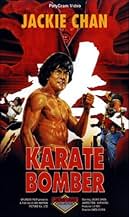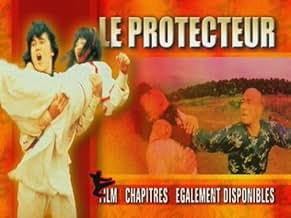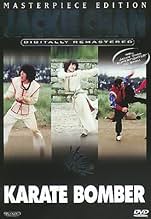VALUTAZIONE IMDb
5,6/10
2292
LA TUA VALUTAZIONE
Aggiungi una trama nella tua linguaA young man poses as "the Whip King" and collects the reward for a bandit he has seen killed by a famous bounty hunter. He must now learn Kung Fu if he is to live up to this new persona and ... Leggi tuttoA young man poses as "the Whip King" and collects the reward for a bandit he has seen killed by a famous bounty hunter. He must now learn Kung Fu if he is to live up to this new persona and conquer the enemies he has inherited.A young man poses as "the Whip King" and collects the reward for a bandit he has seen killed by a famous bounty hunter. He must now learn Kung Fu if he is to live up to this new persona and conquer the enemies he has inherited.
Jackie Chan
- Jiang
- (as Jacky Chan)
Kang Chin
- Thousand-Faces
- (as Kong Kam)
Recensioni in evidenza
believe it or not, this was my first chan experiance. i was delighted at how they mixed humor and action. but 15 years later, i rewatched it, only to find it wasnt nearly as good as his newer(or older) films. i would like to take these last few lines to say that Jackie Chan is the man and no one could ever be as good as he is. thank you, and good night.
I've said it before, I'll say it again: I think Jackie Chan's pre-Drunken Master movies are pure gold. Not for the same reasons that make'Drunken Master' and following movies gold, but gold nonetheless. 'Half a Loaf of Kung Fu' is rather gold. I swear, the more the 70s kung-fu movies I watch, the easier it becomes to watch them, and the more I like them and wish to seek out more. Now there's a scary thought...
I missed the name of Chan's character here. In fact, I missed most, if not all, of the character's names in this movie. Actually, I missed most of the plot too. Actually... Plot? What plot? I still can't figure out what this was actually about, and there no identifiable threads running in the plot other than the evil-witch and the treasure she wants to steal.
'Half a Loaf of Kung Fu' is very funny movie, and I'm sure Chan was trying to spoof kung-fu films. It probably would have worked had other kung-fu movies of the time not been sillier that 'Half a Loaf...' in the first place. The fight scenes are credible enough to maintain interest when the plot-apparent lags. 'Half a Loaf...' does drag on a bit at times, especially when it just gets to ridiculous. It probably could have been shorter, and much more entertaining for it.
It isn't the best of 70s kung-fu movies, but it is by no means the worst. Jackie Chan fans might get a kick out of this, as would others looking for something to laugh at - 6/10
I missed the name of Chan's character here. In fact, I missed most, if not all, of the character's names in this movie. Actually, I missed most of the plot too. Actually... Plot? What plot? I still can't figure out what this was actually about, and there no identifiable threads running in the plot other than the evil-witch and the treasure she wants to steal.
'Half a Loaf of Kung Fu' is very funny movie, and I'm sure Chan was trying to spoof kung-fu films. It probably would have worked had other kung-fu movies of the time not been sillier that 'Half a Loaf...' in the first place. The fight scenes are credible enough to maintain interest when the plot-apparent lags. 'Half a Loaf...' does drag on a bit at times, especially when it just gets to ridiculous. It probably could have been shorter, and much more entertaining for it.
It isn't the best of 70s kung-fu movies, but it is by no means the worst. Jackie Chan fans might get a kick out of this, as would others looking for something to laugh at - 6/10
Jackie is finally given creative control under the constraints of Lo Wei and here's the result: an early key to the new direction which sees Chan clowning about in his own distinct fashion, less Bruce Lee and more Charlie Chaplin, ridiculing the stifling pictures that were forced onto him at the same time as sending up the genre as a whole. Straight from the slapstick titles we know what we're in for; Chan perfecting his underdog happy-go-lucky character that would later make him such a huge star. Yet like all beginnings, HALOKF isn't a polished piece, certainly dragging in places with the Lo Wei influence still clearly evident (namely in the souped-up story concerning the transportation of sacred treasures the Evergreen Jade and the Soul Pill, much in demand by nasty bandits). Lo Wei's reaction was open detest resulting in the picture being shelved, only to be given a successful theatrical release after Chan had finally re-defined the kung fu movie.
"Jackie Chan plays the part of Jiang, an orphan who is neither good in the literary nor the martial arts. Nevertheless, he's a happy-go-lucky fellow with an amiable personality. Saintly beggar Mao, who was a Kung Fu Master, is impressed by Jiang's earnest demeanor and takes Jiang in as a student. Liang joins the Sern Chuan Bodyguards, who have been entrusted with the task of escorting the priceless Evergreen Jade to safekeeping. Outnumbered by an army of ruthless highwaymen, the Sern Chuan sustain heavy losses during their long and grueling journey. Undaunted, Jiang refuses to admit defeat, and with only the spirit of Mao to guide him, singlehandedly defeats the enemy horde."
I don't blame Jackie Chan for finding a new contract after this movie. In the movie, his name was misspelled as 'Jacky Chan'.
Best Quote: "It's my Kung Fu. It's no good for anything, except laughs."
Worst Quote: "If I'm lying to you, then I'm a SOB."
Best New Fighting Technique Introduced: the Concubine
I don't blame Jackie Chan for finding a new contract after this movie. In the movie, his name was misspelled as 'Jacky Chan'.
Best Quote: "It's my Kung Fu. It's no good for anything, except laughs."
Worst Quote: "If I'm lying to you, then I'm a SOB."
Best New Fighting Technique Introduced: the Concubine
Jackie had moved from the Peking opera to the film industry as a teen, but had done mostly bit parts, eventually gaining respect behind the scenes for his commitment to stuntwork and willingness to do anything in any film. However, Hong Kong directors were still trying to figure out what Bruce Lee had done, and he was suddenly gone... they tried to find a replacement for him and copy his films, but the magnetism and quality wasn't there, leaving the HK film industry churning out a lot of mostly forgettable schlock in the 70s.
Jackie was coming up in this time, and a lot of his earlier roles attempt to cast him in the part of the upstart hero. Audiences at the time didn't go for him however (he was well-known then for NOT being handsome) and directors tried casting him as a stock villain, which didn't really work either.
Finally, uber-director/producer Lo Wei let Jackie start having more creative control, finally resulting in Jackie acting as the 'action director' or 'martial arts director'. You see a bit of this in the film "Shaolin Wooden Men", but it starts really blooming here with "Half a Loaf of Kung Fu". In this film, you see a huge emphasis on comedy over action, and very avante' garde choreography for the fights. This is also a departure in tone from many of Jackie's previous films which centered on oppression and hardship and featured quite graphic violence, death, and rape. Here, the comedy is almost nonstop, with Chan continuing to fight a man even as he's just hanging impaled on a spear....which everyone soon realizes and all have a good laugh about.
The story bears a lot of similarities to several of Jackie's partnerships with Chi-Hwa Chen, like "Shaolin Wooden Men", and "36 Crazy Fists". The 'hero' is actually a bumbling fool, who nevertheless manages to improve his kung-fu to heroic levels in a very short period of time. Of course, the traditional kung-fu masters are actually not the best, the fool learns all the best techniques from old drunken hermits who taunt him as they berate and steal from him, much as Yoda later would to Luke. These same off-the-wall techniques are, of course, the secret to finally defeating the evil gangsters who are rampaging in the town/village/countryside. These films also all have a great number of random story elements and lightning-quick plot twists. Characters are introduced out of nowhere, form alliances, double-cross each other, patch things up, or ultimately die suddenly, all before you can figure out why they were in the film in the first place! If you're looking for Shakespeare, you won't find it here, but the story of this movie actually took me back to being 6 years old and just being amazed at the freshness and unpredictability of these films compared to your cookie-cutter Hollywood movie. There's a definite charm here.
The comedy, on the other hand, fell pretty flat for me. It doesn't quite work as a satire of the films at the time, and it's not as fine-tuned as the comedy in his later films.I chuckled a couple times, but mostly it was a lot of over-the-top cheesy slapstick that I don't think would appeal to most people that aren't an Asian audience in the 70s.
The martial arts is a bit of a mixed bag. The regular performers aren't doing anything very special here, and this is definitely an ensemble film. Even Jackie takes quite a while to warm up, as the whole point in the beginning is that his skills suck. The sequences toward the end of the film start becoming more and more inventive, though, and it's a kick to see Jackie 'learning' wacky techniques and then trying to apply them at every chance in future fights. The final fight is a worthy addition to the Chan 'notable fights' reel, with him attempting to study scrolls of techniques littering the ground WHILE fighting, so that he can then use those techniques IN the fight! It's good stuff, and exemplary of why this movie is the first real step into the Jackie Chan films we all later came to know and love.
Jackie was coming up in this time, and a lot of his earlier roles attempt to cast him in the part of the upstart hero. Audiences at the time didn't go for him however (he was well-known then for NOT being handsome) and directors tried casting him as a stock villain, which didn't really work either.
Finally, uber-director/producer Lo Wei let Jackie start having more creative control, finally resulting in Jackie acting as the 'action director' or 'martial arts director'. You see a bit of this in the film "Shaolin Wooden Men", but it starts really blooming here with "Half a Loaf of Kung Fu". In this film, you see a huge emphasis on comedy over action, and very avante' garde choreography for the fights. This is also a departure in tone from many of Jackie's previous films which centered on oppression and hardship and featured quite graphic violence, death, and rape. Here, the comedy is almost nonstop, with Chan continuing to fight a man even as he's just hanging impaled on a spear....which everyone soon realizes and all have a good laugh about.
The story bears a lot of similarities to several of Jackie's partnerships with Chi-Hwa Chen, like "Shaolin Wooden Men", and "36 Crazy Fists". The 'hero' is actually a bumbling fool, who nevertheless manages to improve his kung-fu to heroic levels in a very short period of time. Of course, the traditional kung-fu masters are actually not the best, the fool learns all the best techniques from old drunken hermits who taunt him as they berate and steal from him, much as Yoda later would to Luke. These same off-the-wall techniques are, of course, the secret to finally defeating the evil gangsters who are rampaging in the town/village/countryside. These films also all have a great number of random story elements and lightning-quick plot twists. Characters are introduced out of nowhere, form alliances, double-cross each other, patch things up, or ultimately die suddenly, all before you can figure out why they were in the film in the first place! If you're looking for Shakespeare, you won't find it here, but the story of this movie actually took me back to being 6 years old and just being amazed at the freshness and unpredictability of these films compared to your cookie-cutter Hollywood movie. There's a definite charm here.
The comedy, on the other hand, fell pretty flat for me. It doesn't quite work as a satire of the films at the time, and it's not as fine-tuned as the comedy in his later films.I chuckled a couple times, but mostly it was a lot of over-the-top cheesy slapstick that I don't think would appeal to most people that aren't an Asian audience in the 70s.
The martial arts is a bit of a mixed bag. The regular performers aren't doing anything very special here, and this is definitely an ensemble film. Even Jackie takes quite a while to warm up, as the whole point in the beginning is that his skills suck. The sequences toward the end of the film start becoming more and more inventive, though, and it's a kick to see Jackie 'learning' wacky techniques and then trying to apply them at every chance in future fights. The final fight is a worthy addition to the Chan 'notable fights' reel, with him attempting to study scrolls of techniques littering the ground WHILE fighting, so that he can then use those techniques IN the fight! It's good stuff, and exemplary of why this movie is the first real step into the Jackie Chan films we all later came to know and love.
Lo sapevi?
- QuizConsidered one of the earliest Kung Fu "spoof" movies.
- Versioni alternativeUK video version is cut by 3m 7s. In 2002 all previous cuts were waived by the BBFC.
- ConnessioniReferenced in Adjust Your Tracking: The Untold Story of the VHS Collector (2013)
- Colonne sonoreThe Coach Robbery
Written by John Addison
I più visti
Accedi per valutare e creare un elenco di titoli salvati per ottenere consigli personalizzati
Dettagli
Contribuisci a questa pagina
Suggerisci una modifica o aggiungi i contenuti mancanti
















